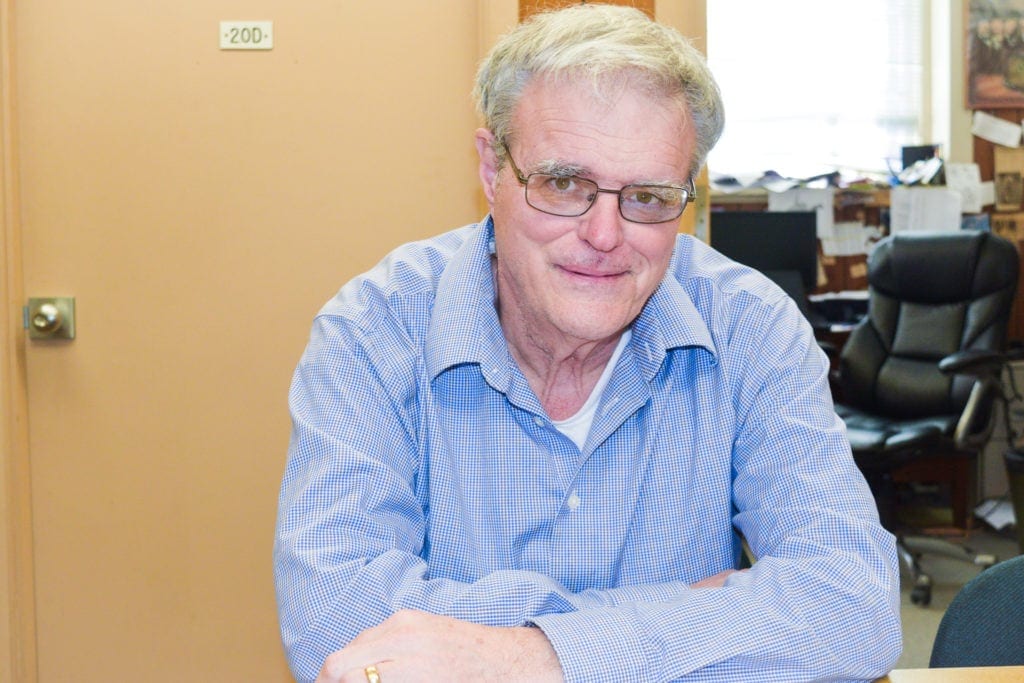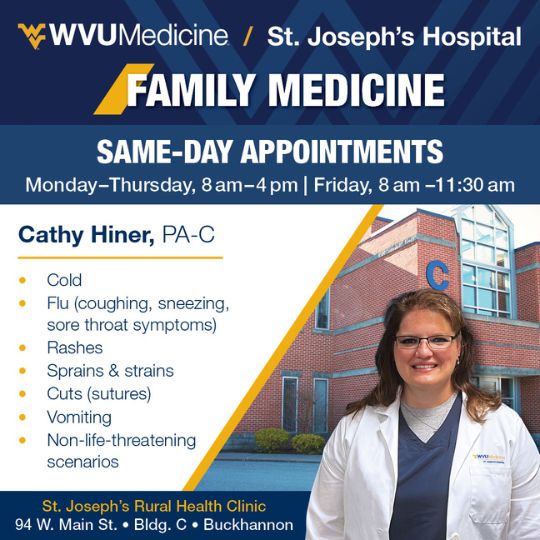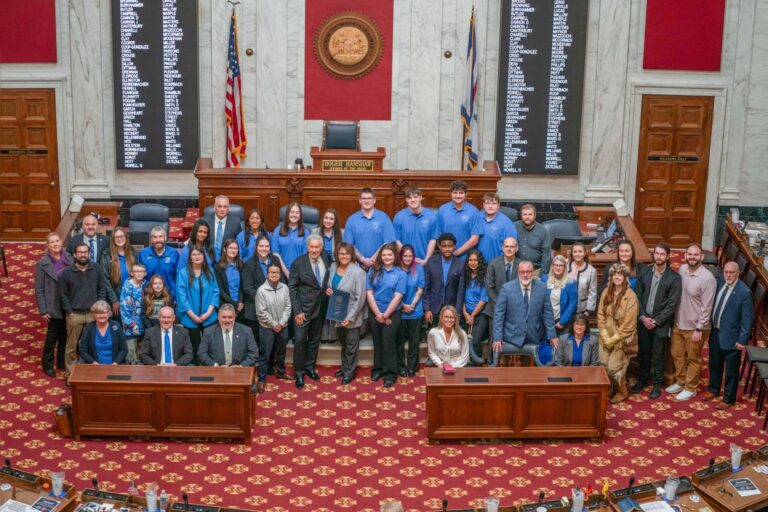BUCKHANNON – In the wake of the two-day work stoppage in West Virginia schools last week, many people have wondered what the teachers’ strike and the defeat of the education ‘omnibus’ bill indicates about politics in the Mountain State.
Luckily, My Buckhannon didn’t have to search too far for answers to questions surrounding Senate Bill 451.
West Virginia Wesleyan College professor of political science and history and longtime political analyst Dr. Robert Rupp recently weighed in on what he believes is brewing in West Virginia’s political climate.
Rupp said he calls recent events – the Feb. 19-20 teacher strike/work stoppage in reaction to the state Senate’s passage of the sweeping education reform bill – “a moment in history.”
“This is a historic event, because in the past, we have not had a strong teachers’ union,” Rupp said. “You start with the very fact that the state has not one, but two [unions] and that in the last decade, the electoral strength of the teachers’ unions has gone down, just as unions have gone up in the state.”
Last year, during the West Virginia teacher walkout, Rupp said there was unity between teachers’ unions in all 55 counties, all West Virginia Boards of Education and all superintendents.
“That amazing show of unity – which they had not shown in the past – ended up getting not only results in the state, but national attention,” Rupp said. “If we are really looking at history, the verb ‘to West Virginia’ is now meaning to mobilize teachers using a strike to get action.”
He said for the first time, other states are imitating us.
“It’s been a long time since we had that attention to the labor,” he said.
“If we are looking at other dynamics, I was surprised that they would come back a second time, but the fact that it worked suggests a number of things,” Rupp said. “First, it suggests an overreach by (Senate President) Mitch Carmichael.
“In terms of theory, he is championing charter schools. There is research that goes back and forth as far as their effectiveness. But more important, in process, he took no action to incorporate West Virginians – either educators or experts in that area.”
Rupp said you could say Carmichael used a Xerox machine because much of the material in SB 451 seemed to be taken from the conservative organization ALEC, which according to its website, “draft[s] and share[s] model state-level legislation for distribution to state governments.”
“We could speculate that … for 80 years, the Republicans have been a minority party, so until 2014, they have had no experience in being the majority party,” Rupp said. “You could argue that this was an example of overreach – they did not fully understand the political landscape they were dealing in.”
Rupp said another aspect of the strike that surprised him is in Appalachian political culture, change is not readily and quickly accepted.
“We seem to have a tendency to go slow when given the option to go slow,” he said. “I think this was simply too rapid a change. I can understand where he (Carmichael) is getting at – he is trying to make one big package and settle everything at once, and I think it was simply too much in terms of content, and it was not enough in terms of reaching out to the state educational leaders and movers and shakers.”
Finally, Rupp said he feels Carmichael still holds on to the view that education is simply a business.
“He kept talking about competition,” Rupp reflected. “In public education, the school boards are required to provide education for everyone. Charter schools do not have to accept everyone; they are run by a different standard. So, the idea this is setting up competition doesn’t make any sense. Probably, what is more disserving is that under the bill that was proposed, teachers at charter schools did not even need a high school diploma.
“In the end, what are we saying? West Virginia is making history – specifically, teacher unions for the first time in decades. This is the second time the Republican leadership in Charleston is not working out. If we get to that divide, the irony is the Republicans waited 80 years to take over both houses of the Legislature, and they end up with two contending bodies. You have Mitch Carmichael in the State Senate, and you have the House and they are not getting their act together.”
Rupp said the teachers staying out on strike for the second day was one of the most disturbing aspects of the work stoppage.
“We are a small state and we have to operate on a quota of trust in each other,” Rupp said. “By holding out that second day, what the teachers were saying is ‘I don’t trust the system at all – I think there is going to be a last-minute switch.’ So, they literally waited until the end.”
(Despite nearly universal declarations that SB 451 was dead, teachers’ unions opted to stay out a second day, fearing legislators might orchestrate a way to motion to reconsider — and possibly revive — SB 451.
According to legislative rules, a motion to reconsider a bill cannot be made once 24 hours passes.)
Rupp said given the verbiage in Charleston, he could understand the teachers’ concerns.
“But as a political scientist, it shows a very low level of trust between the citizen and the politician – and I find that disturbing,” Rupp said.
On the West Virginia Department of Education website during this teacher strike, Putnam County Schools indicated they would still be open both days of the strike. Rupp said there are two mysteries he sees in life – one being the abominable snowman and the other, why Putnam County was the only county that did not support its teachers and close for those two days.
“I have not yet heard a sound reason why (they did not close),” Rupp said. “This becomes very important because the only way the first strike worked was because it had total unity between the bus drivers, the staff, the teachers, the board of ed in #55Strong. That was – given past history of this state –
that unity was very surprising.”
Rupp said that unity over the past two years indicates two things – either teachers have become more effective at rallying together or the problem, question or worry brought them together.
“But whatever it is, I go back to my first statement – it was a historic event,” Rupp said. “The fact that we have the second act after the first act, shows that teachers have become a powerful political force that they had not been for the last 20 years. Now, how long that will last, I do not know.”
Rupp said the teacher strike adds another challenge to teachers as a political faction – that they retain their status as a powerful presence.
“There is another lesson, and they learned that lesson – the quote is ‘the price of freedom is eternal vigilance,’” Rupp said. “The price of political power is eternal education. What I mean by that is, the teachers now have taken a heightened interest into what bills are proposed, what legislators are proposing them, what changes are being made.
“Watching the Legislature is a full-time job, and I am finding a number of teachers are paying attention in a way that they did not pay before which might explain their past successes.”
Rupp said like human beings, political factions have short-term memories.
“When the Legislature enacted what was seen as some anti-union bills, the slogan was, ‘we will remember in November.’ But by the time November came by, they didn’t remember, and it undercut their power,” Rupp said. “With the last teacher strike, they said they would remember, and we saw some definite legislative defeats just because they remembered.”
The question now is, what will happen in the next election, Rupp said.
“How long is the memory?” he asked.

















